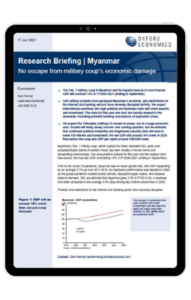No escape from Myanmar military coup’s economic damage

Myanmar’s Feb. 1 military coup, which ousted the newly reelected NDL party over unsubstantiated claims of election fraud, has been deadly in human terms and devastating economically. Our once-positive outlook for this year and the medium term has soured. We now see GDP contracting 13% in FY2020-2021 (ending in September).
What you will learn:
- The Feb. 1 military coup in Myanmar and its impacts lead us to now forecast GDP will contract 13% in FY2020-2021 (ending in September).
- Anti-military protests have paralyzed Myanmar’s economy, and restrictions on the internet and banking sectors have severely disrupted activity. We expect international sanctions and high political and business risks will crush exports and investment. The risks for this year and next are heavily skewed to the downside, including potential banking and balance-of-payments crises.
- We expect the Tatmadaw (military) to remain in power, but at a huge economic cost. Growth will likely slowly recover over coming quarters, but we estimate that continued political instability and heightened security risks will lead to lower FDI inflows and investment. We see GDP still around 18% lower in 2025 than before the coup and GDP per capita around US$1000 lower.
Tags:
Related Services

Post
UK: Supply constraints are probably less prominent in the south
The extent to which UK employers can respond to likely 2024 interest rate cuts with increased output, rather than rises in prices and wages, will partly reflect the extent of spare capacity. This will inevitably vary by region. Evidence on this is imperfect, but in terms of capital assets (including intangibles) and labour availability, southern regions appear to be in a stronger position than those in the UK's traditional industrial heartland.
Find Out More
Post
Global Private equity real estate fund maturities spur asset sales
We expect the significant increases in fund maturities, spurred by capital raised over the past decade, to exert upward pressure on the rate of asset disposals as the funds approach the end of their lifecycles.
Find Out More